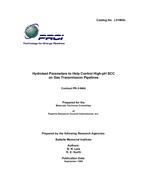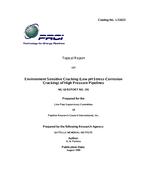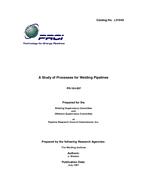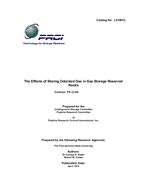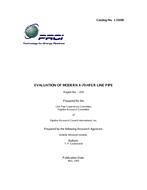Provide PDF Format
PRCI PR-003-9404
- Hydrotest Parameters to Help Control High-pH SCC on Gas Transmission Pipelines
- Report / Survey by Pipeline Research Council International, 09/01/1999
- Publisher: PRCI
$198.00$395.00
L51865e
Battelle Memorial Institute
Need: The infrequent nature of Stress-Corrosion Cracking (SCC) has been a principal reason for its dismissal as a threat to pipeline integrity. However, due to the fact that SCC occurs where the independent effects of stress and environment are benign, incidents of SCC have been largely unanticipated. Even though they occur so seldom, SCC incidents are an important pipeline integrity concern, because the long axial cracks typical of SCC can cause potentially spectacular ruptures with significant consequences. Interest in alternative approaches to manage pipeline integrity in the presence of SCC is motivated by both the risk associated with SCC failures and by the difficulties encountered in attempts to detect it on gas-transmission pipelines via in-line inspection.
Result: This report develops and validates a probabilistic model for high pH SCC on pipelines that can help operators to:
- quantify the condition of susceptible transmission pipelines
- assess the efficiency of controls for such SCC based on after coolers and periodic hydrostatic re-testing
- identify, evaluate, and control the related risks
- prioritize rehabilitation to avoid in-service incidents.
The probabilistic model is an adaptation of a first-generation model for high pH SCC known as the Stress-Corrosion Cracking Life Prediction Model, (SCCLPM). Its validation follows from the close match between simulated cracking populations and incident occurrence and that observed for operating pipelines behavior. Because methods to simulate coating failure have not yet been developed, the model assumes the presence of a cracking environment, which according to field experience adds 3 years or more to the simulated pipeline life.
Benefit: This report describes simulations of the failure behavior of a pipeline experiencing SCC to determine guidelines in terms of operating conditions and hydrostatic re-testing to control cracking and to limit exposure to in-service incidents. Following a discussion of the modeling needed to adequately simulate pipeline SCC behavior, guidelines are recommended for retesting.
Battelle Memorial Institute
Need: The infrequent nature of Stress-Corrosion Cracking (SCC) has been a principal reason for its dismissal as a threat to pipeline integrity. However, due to the fact that SCC occurs where the independent effects of stress and environment are benign, incidents of SCC have been largely unanticipated. Even though they occur so seldom, SCC incidents are an important pipeline integrity concern, because the long axial cracks typical of SCC can cause potentially spectacular ruptures with significant consequences. Interest in alternative approaches to manage pipeline integrity in the presence of SCC is motivated by both the risk associated with SCC failures and by the difficulties encountered in attempts to detect it on gas-transmission pipelines via in-line inspection.
Result: This report develops and validates a probabilistic model for high pH SCC on pipelines that can help operators to:
- quantify the condition of susceptible transmission pipelines
- assess the efficiency of controls for such SCC based on after coolers and periodic hydrostatic re-testing
- identify, evaluate, and control the related risks
- prioritize rehabilitation to avoid in-service incidents.
The probabilistic model is an adaptation of a first-generation model for high pH SCC known as the Stress-Corrosion Cracking Life Prediction Model, (SCCLPM). Its validation follows from the close match between simulated cracking populations and incident occurrence and that observed for operating pipelines behavior. Because methods to simulate coating failure have not yet been developed, the model assumes the presence of a cracking environment, which according to field experience adds 3 years or more to the simulated pipeline life.
Benefit: This report describes simulations of the failure behavior of a pipeline experiencing SCC to determine guidelines in terms of operating conditions and hydrostatic re-testing to control cracking and to limit exposure to in-service incidents. Following a discussion of the modeling needed to adequately simulate pipeline SCC behavior, guidelines are recommended for retesting.
Related Products
PRCI Report 191
Environmental Sensitive Cracking (Low pH SCC) of Hi-Pressure Pipelines..
$125.00 $249.00

